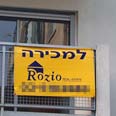
Apartment for sale (archives)
צילום: עומר הכהן
Apartment prices up 2.5% in Q1
Governmental assessor's survey, based on Tax Authority data, shows 6% price rise in Tel Aviv, Netanya's residential real estate; even sharper increase expected in second quarter
A new price survey conducted by Eyal Yitzhaki, the Justice Ministry's chief governmental assessor, points to an unequivocal rise in apartment prices which began in July 2008.
The survey is based on data collected by the Tax Authority and on real deals for second-hand and new apartments conducted during that period, with a sampling of more than 3,200 deals in 15 cities across Israel.
The survey reveals that not one of Israel's 11 biggest cities saw a drop in prices during the first quarter. Netanya and Tel Aviv (NIS 257,000 per room and NIS 433,000 per room, respectively) saw the most significant price hike at a level of 6%.
Rishon Lezion saw a 5% price rise (an average of NIS 266,000 per room), Ashkelon saw prices rise by 4% (an average of NIS 145,000 per room), while in Bat Yam, Petah Tikva and Beersheba prices remained unchanged.
In total, there was an average price rise of about 2.5% compared to the previous quarter.
Yitzhaki used two factors to explain the price hike, the first being the drop in interest rates. Since the beginning of the crisis, the Bank of Israel has lowered the interest rate to its lowest level ever. This trend has reduced the investment assessment in financial channels and has diverted part of the capital to alternative channels, like real estate, raising demands. The average interest rate for mortgages has dropped accordingly.
The second factor is the supply of unsold apartments, which has been at a low point for several years and stands at some 14,000 (in private and public construction). This low supply level created additional pressure for a rise in apartment prices.
The survey reveals additional variables with a weaker influence, such as the fluctuation in the shekel's exchange rate against the US dollar, which in the past had led to a similar change within a short while. Its current influence is estimated as low in light of the public's trend of disconnecting from attaching apartment prices to the dollar, changes in construction standards, etc.
Yitzhaki also estimates that the second quarter of 2009 will see an ongoing trend of rises in apartment prices, and even more intensely, but this estimate does not rely at this stage on a review of deal prices.
Justice Ministry officials noted that the survey was released due to different estimates published in regards to the financial crisis' affect on apartment prices in Israel.
According to the ministry, these estimates don't rely on a real market prices survey, but on estimates and expectations of experts and key players in the real estate industry. The survey was published in order to reduce the level of uncertainty in the real estate industry.










